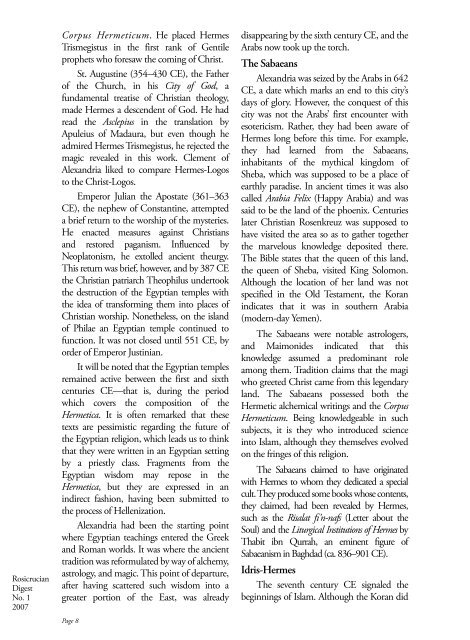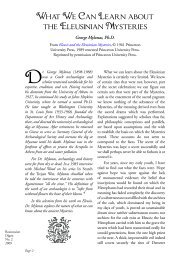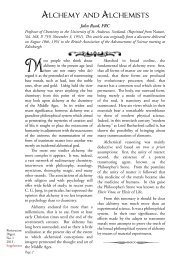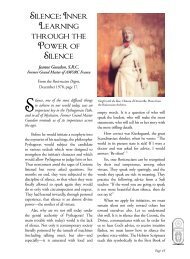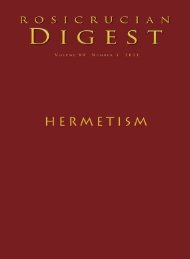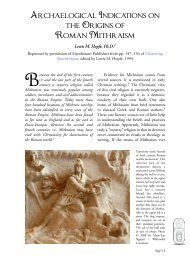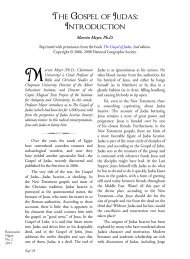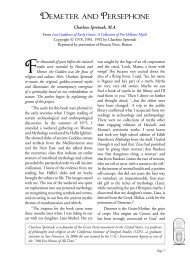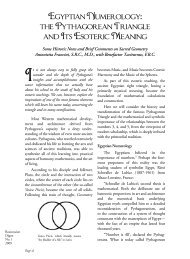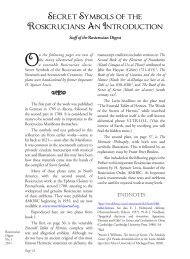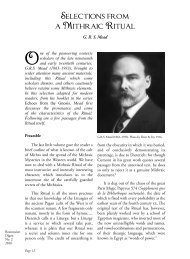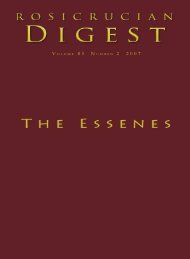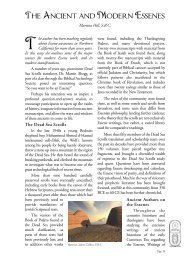Digest - Rosicrucian Order
Digest - Rosicrucian Order
Digest - Rosicrucian Order
Create successful ePaper yourself
Turn your PDF publications into a flip-book with our unique Google optimized e-Paper software.
<strong>Rosicrucian</strong><br />
<strong>Digest</strong><br />
No. 1<br />
2007<br />
Corpus Hermeticum. He placed Hermes<br />
Trismegistus in the first rank of Gentile<br />
prophets who foresaw the coming of Christ.<br />
St. Augustine (354–430 CE), the Father<br />
of the Church, in his City of God, a<br />
fundamental treatise of Christian theology,<br />
made Hermes a descendent of God. He had<br />
read the Asclepius in the translation by<br />
Apuleius of Madaura, but even though he<br />
admired Hermes Trismegistus, he rejected the<br />
magic revealed in this work. Clement of<br />
Alexandria liked to compare Hermes-Logos<br />
to the Christ-Logos.<br />
Emperor Julian the Apostate (361–363<br />
CE), the nephew of Constantine, attempted<br />
a brief return to the worship of the mysteries.<br />
He enacted measures against Christians<br />
and restored paganism. Influenced by<br />
Neoplatonism, he extolled ancient theurgy.<br />
This return was brief, however, and by 387 CE<br />
the Christian patriarch Theophilus undertook<br />
the destruction of the Egyptian temples with<br />
the idea of transforming them into places of<br />
Christian worship. Nonetheless, on the island<br />
of Philae an Egyptian temple continued to<br />
function. It was not closed until 551 CE, by<br />
order of Emperor Justinian.<br />
It will be noted that the Egyptian temples<br />
remained active between the first and sixth<br />
centuries CE—that is, during the period<br />
which covers the composition of the<br />
Hermetica. It is often remarked that these<br />
texts are pessimistic regarding the future of<br />
the Egyptian religion, which leads us to think<br />
that they were written in an Egyptian setting<br />
by a priestly class. Fragments from the<br />
Egyptian wisdom may repose in the<br />
Hermetica, but they are expressed in an<br />
indirect fashion, having been submitted to<br />
the process of Hellenization.<br />
Alexandria had been the starting point<br />
where Egyptian teachings entered the Greek<br />
and Roman worlds. It was where the ancient<br />
tradition was reformulated by way of alchemy,<br />
astrology, and magic. This point of departure,<br />
after having scattered such wisdom into a<br />
greater portion of the East, was already<br />
Page 8<br />
disappearing by the sixth century CE, and the<br />
Arabs now took up the torch.<br />
The Sabaeans<br />
Alexandria was seized by the Arabs in 642<br />
CE, a date which marks an end to this city’s<br />
days of glory. However, the conquest of this<br />
city was not the Arabs’ first encounter with<br />
esotericism. Rather, they had been aware of<br />
Hermes long before this time. For example,<br />
they had learned from the Sabaeans,<br />
inhabitants of the mythical kingdom of<br />
Sheba, which was supposed to be a place of<br />
earthly paradise. In ancient times it was also<br />
called Arabia Felix (Happy Arabia) and was<br />
said to be the land of the phoenix. Centuries<br />
later Christian Rosenkreuz was supposed to<br />
have visited the area so as to gather together<br />
the marvelous knowledge deposited there.<br />
The Bible states that the queen of this land,<br />
the queen of Sheba, visited King Solomon.<br />
Although the location of her land was not<br />
specified in the Old Testament, the Koran<br />
indicates that it was in southern Arabia<br />
(modern-day Yemen).<br />
The Sabaeans were notable astrologers,<br />
and Maimonides indicated that this<br />
knowledge assumed a predominant role<br />
among them. Tradition claims that the magi<br />
who greeted Christ came from this legendary<br />
land. The Sabaeans possessed both the<br />
Hermetic alchemical writings and the Corpus<br />
Hermeticum. Being knowledgeable in such<br />
subjects, it is they who introduced science<br />
into Islam, although they themselves evolved<br />
on the fringes of this religion.<br />
The Sabaeans claimed to have originated<br />
with Hermes to whom they dedicated a special<br />
cult. They produced some books whose contents,<br />
they claimed, had been revealed by Hermes,<br />
such as the Risalat fi’n-nafs (Letter about the<br />
Soul) and the Liturgical Institutions of Hermes by<br />
Thabit ibn Qurrah, an eminent figure of<br />
Sabaeanism in Baghdad (ca. 836–901 CE).<br />
Idris-Hermes<br />
The seventh century CE signaled the<br />
beginnings of Islam. Although the Koran did


